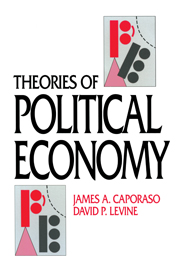Book contents
- Frontmatter
- Contents
- Preface
- Theories of political economy
- Introduction
- 1 Politics and economics
- 2 The classical approach
- 3 Marxian political economy
- 4 Neoclassical political economy
- 5 Keynesian political economy
- 6 Economic approaches to politics
- 7 Power-centered approaches to political economy
- 8 State-centered approaches to political economy
- 9 Justice-centered theories
- Conclusion
- Bibliography
- Index
Introduction
Published online by Cambridge University Press: 05 June 2012
- Frontmatter
- Contents
- Preface
- Theories of political economy
- Introduction
- 1 Politics and economics
- 2 The classical approach
- 3 Marxian political economy
- 4 Neoclassical political economy
- 5 Keynesian political economy
- 6 Economic approaches to politics
- 7 Power-centered approaches to political economy
- 8 State-centered approaches to political economy
- 9 Justice-centered theories
- Conclusion
- Bibliography
- Index
Summary
When political economy emerged in the eighteenth century, it did so to help people understand and cope with a dramatic change in the system of want satisfaction, both in the nature of wants and in the manner of production and distribution of goods for satisfying them. The shift from the older term “economy” to the newer term “political economy” marked this change. Economy, taken from the Greek usage, referred to household management. It had relevance to a society in which, to an important degree, wants emerged and the things that satisfied them were produced in the household. Political economy referred to the management of the economic affairs of the state.
The term “political” refers us to two interrelated qualities of the system of want satisfaction. First this system links persons otherwise independent: strangers rather than relatives. To satisfy our wants we now depend on persons not our relatives, whom we might not even know. Second, the boundaries of want satisfaction are now political; responsibility for the system of want satisfaction devolves onto a public authority: the head of state rather than the head of the household. In its earliest period, political economy sought to advise the statesman on how he could best manage the economic affairs of the state so that the wants of the citizens would be met.
The emergence of political economy brought with it a debate over the responsibilities of the state (or statesman) with regard to the economy.
- Type
- Chapter
- Information
- Theories of Political Economy , pp. 1 - 6Publisher: Cambridge University PressPrint publication year: 1992

